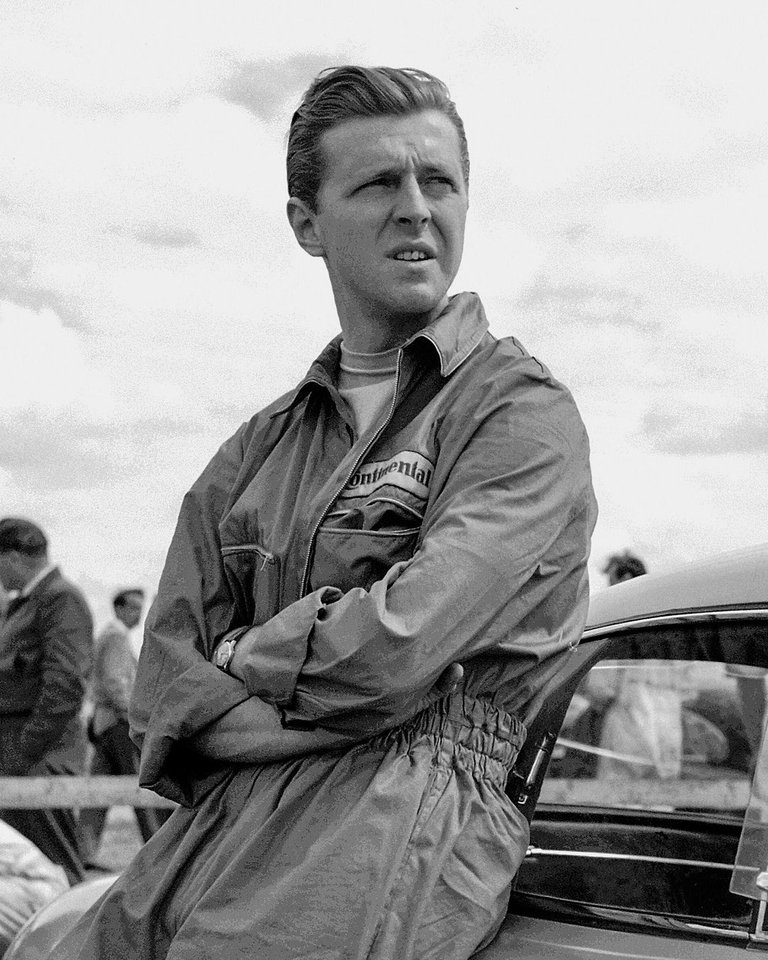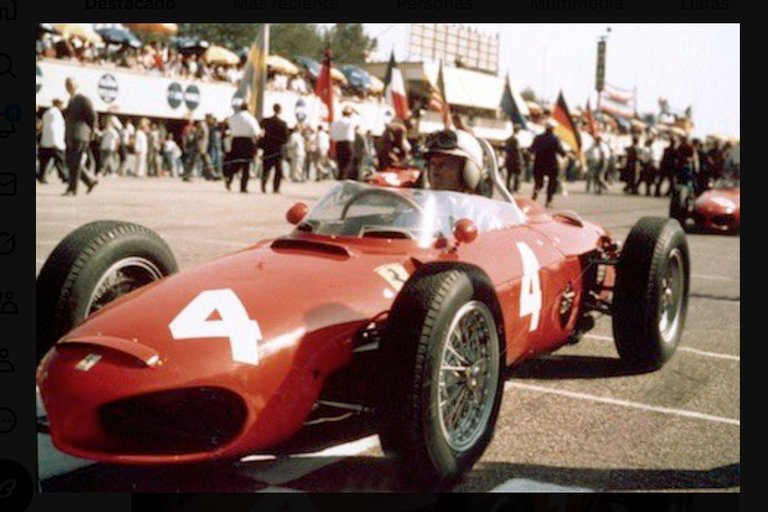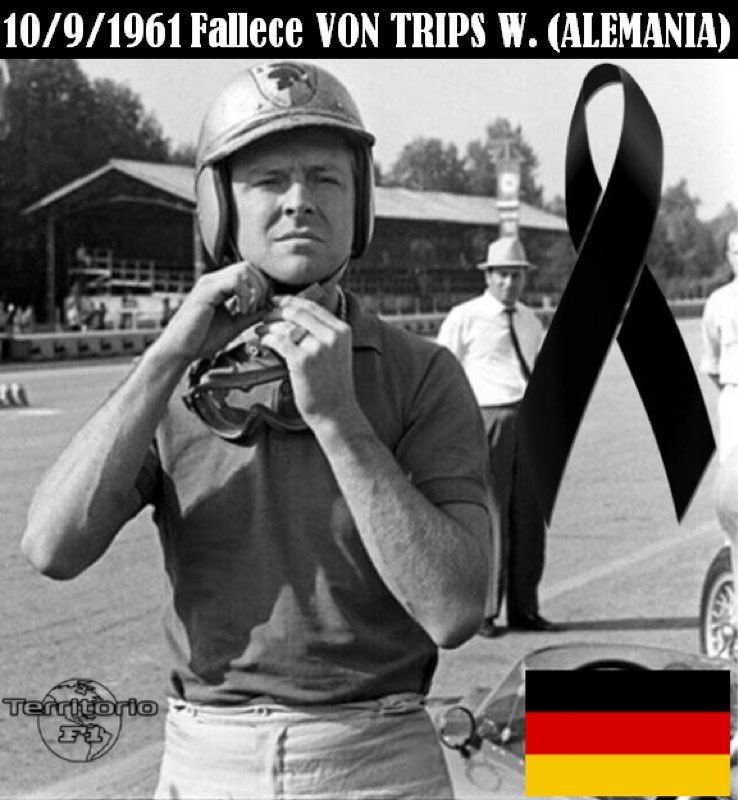Ganar o morir en el intento (SPA-ENG)

El título de esta nota es una frase de gran impacto, aunque generalmente se utiliza de forma alegórica, poética, llegado el caso, difícilmente quien la menciona crea que es un mandato literal y que una persona deba morir si no alcanza el objetivo deseado.
En el pasado, cuando el honor se valoraba profundamente, la posición social, la educación basada en sólidas raíces morales y la opinión pública tenían una importancia mucho mayor que en la actualidad; algunas personas la tomaban muy en serio.
Quizás ese mandato fue lo que cumplió a rajatablas un piloto de Fórmula Uno del que hablé tangencialmente un tiempo atrás cuando describí algunos de los accidentes más espectaculares y trágicos en toda la historia de categoría, el ocurrido en Monza en el año 1961 y donde perdieron la vida 13 espectadores más el piloto en cuestión: Wolfgang von Trips.
El joven piloto alemán de 31 años de edad había nacido en cuna de oro, hijo de padres pertenecientes a la alta aristocracia alemana; su padre era conde y terrateniente importante de la zona de Colonia, en la Alemania Federal de la posguerra.

Cuentan los mitos tejidos alrededor de su figura que apenas recibido de ingeniero agrónomo, Wolfgang se presentó ante su padre para decirle que no iba a continuar con la tradición familiar y hacerse cargo de las tierras de su propiedad, quería ser piloto de competición y más específicamente de F1. A su progenitor no le causó gracia la decisión, la acató aunque no sin antes recordarle su posición social y lo que se esperaba de él: toda Alemania estaría pendiente, debía ser campeón o morir en el intento. Sobre este relato nadie podrá decir con absoluta certeza qué hay de cierto y qué de mito, solo se puede especular con el trágico final.

El 10 de septiembre de 1961, Wolfgang Von Trip, a bordo de una Ferrari oficial, había conseguido la primera posición de largada para el Gran Premio de Italia en el veloz circuito de Monza, punteaba el campeonato y si ganaba esa carrera se aseguraba el título. Sin embargo el destino tenía otros planes, en el transcurso de la segunda vuelta fue tocado en una de sus ruedas traseras por Jim Clark que venía peleando la posición, eso lo desestabilizó, perdió el control impactando contra una barrera lateral, el vehículo salió volando y Von Trips fue despedido de su asiento para caer en medio de la pista, mientras tanto los restos de la Ferrari incendiada cayeron sobre el público. El alemán murió mientras era trasladado al hospital; el trágico saldo restante ya lo sabemos.
La carrera continuó y fue ganada por el compañero de equipo de Von Trips, el norteamericano Phil Hill, que se consagró campeón por solo un punto de diferencia con el fallecido. Fue el primer norteamericano en consagrarse campeón mundial de pilotos de F1.

1961 fue el último año del óvalo de Monza; a partir de 1962 el circuito se modificó y se clausuraron el sector peraltado y las tribunas donde ocurrió el accidente, se construyeron nuevas, más altas y alejadas de las zonas de peligro.
Wolfgang Von Trips era el único hijo y heredero de la dinastía familiar nacida 10 siglos antes, herencia aristocrática que finalizó abruptamente con su muerte prematura sin herederos. Sin embargo, hay una historia que enlaza su herencia como piloto con uno de los más grandes campeones que ha dado el automovilismo mundial, otro alemán, Michael Schumacher, pero esa es otra historia que también merece ser contada, prontamente.
Win or die trying
The title of this article is a powerful phrase, although it is generally used allegorically, poetically. If necessary, the person who mentions it will hardly believe that it is a literal command and that a person must die if they do not achieve the desired goal.
In the past, when honor was deeply valued, social position, education based on solid moral roots, and public opinion were of much greater importance than they are today; some people took them very seriously.
Perhaps that command was strictly adhered to by a Formula One driver I mentioned tangentially some time ago when describing some of the most spectacular and tragic accidents in the entire history of the category: the one that occurred at Monza in 1961, which killed 13 spectators plus the driver in question: Wolfgang von Trips.
The young 31-year-old German driver was born into a family of silver, the son of parents belonging to the German high aristocracy; His father was a count and a prominent landowner in the Cologne area, in post-war West Germany.
The myths woven around him tell us that barely after graduating as an agricultural engineer, Wolfgang approached his father to tell him he wasn't going to continue the family tradition and take over the land he owned. He wanted to be a racing driver, and more specifically, an F1 driver. His father wasn't amused by the decision, but complied, though not before reminding him of his social position and what was expected of him: all of Germany would be watching; he had to be a champion or die trying. No one can say with absolute certainty what is true and what is myth about this story; one can only speculate about the tragic ending.
On September 10, 1961, Wolfgang Von Trip, driving a factory Ferrari, had taken pole position at the start of the Italian Grand Prix on the fast Monza circuit. He was leading the championship, and if he won that race, he would secure the title. However, fate had other plans. During the second lap, he was hit on one of his rear wheels by Jim Clark, who was fighting for position. This destabilized him. He lost control, hitting a side barrier. The car went airborne, and Von Trips was thrown from his seat and landed in the middle of the track. Meanwhile, the wreckage of the burning Ferrari rained down on the spectators. The German died while being taken to the hospital; the final toll is already known.
The race continued and was won by Von Trips' teammate, American Phil Hill, who was crowned champion by just one point. He was the first American to win the F1 World Drivers' Championship.
1961 was the final year of the Monza oval; starting in 1962, the circuit was modified, and the banked section and grandstands where the accident occurred were closed. New ones were built, higher and further away from the danger zones.
Wolfgang Von Trips was the only son and heir to the family dynasty born 10 centuries earlier, an aristocratic legacy that abruptly ended with his untimely death without heirs. However, there is a story that links his legacy as a racing driver to one of the greatest champions ever produced in world motorsports, another German, Michael Schumacher. But that is another story that also deserves to be told, soon.
Héctor Gugliermo
@hosgug
Me impresionan esas historias insólitas que nos traes sobre la historia del automovilismo mundial desde épocas de antaño, es muy gratificante leerte siempre amigo @hosgug, saludos
Muchas gracias @sadiel0102, me gusta mucho la historia de los deportes, por supuesto unos más que otros, así que cada vez que puedo escribo algo sobre esto.
Saludos!
Thank you @comedyclubhouse
Congratulations @hosgug! You have completed the following achievement on the Hive blockchain And have been rewarded with New badge(s)
Your next target is to reach 9250 replies.
You can view your badges on your board and compare yourself to others in the Ranking
If you no longer want to receive notifications, reply to this comment with the word
STOP